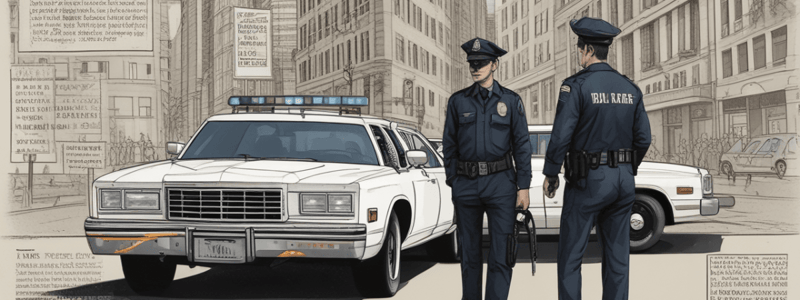Podcast
Questions and Answers
Match the following legal concepts with their definitions:
Match the following legal concepts with their definitions:
Probable cause = Facts and circumstances sufficient in themselves to cause a reasonable officer to believe an offense has been or is being committed. Reasonable suspicion = Suspicion based upon objective facts and circumstances that a person has committed, is committing, or is about to commit a violation of the criminal law or ordinances. Physical or mental impairment = Includes, but is not limited to, such contagious and non-contagious diseases and conditions as orthopedic, visual, speech and hearing impairments, cerebral palsy, epilepsy, muscular dystrophy, multiple sclerosis, cancer, heart disease, diabetes, mental retardation, emotional illness, specific learning disabilities, HIV disease, tuberculosis, drug addiction, and alcoholism. Regarded as having an impairment = Has a physical or mental impairment that does not substantially limit major life activities but that is treated by a public entity as constituting such a limitation.
Match the following phrases with their descriptions:
Match the following phrases with their descriptions:
Contagious diseases = Include tuberculosis and HIV disease. Non-contagious diseases = Include cancer, heart disease, diabetes, and muscular dystrophy. Orthopedic impairments = Include speech and hearing impairments. Emotional illness = Exclude mental retardation and specific learning disabilities.
Match the following conditions with their classification:
Match the following conditions with their classification:
Homosexuality or bisexuality = Not considered as physical or mental impairment. Drug addiction = Considered as physical or mental impairment. Epilepsy = Considered as physical or mental impairment. Alcoholism = Not considered as physical or mental impairment.
Match the following phrases with their meanings:
Match the following phrases with their meanings:
Match the following phrases with their relationships:
Match the following phrases with their relationships:
Match the following phrases with their examples:
Match the following phrases with their examples:
Match the following terms with their definitions:
Match the following terms with their definitions:
Match the following terms with their definitions:
Match the following terms with their definitions:
Match the following terms with their definitions:
Match the following terms with their definitions:
Match the following terms with their definitions:
Match the following terms with their definitions:
Match the following terms with their definitions:
Match the following terms with their definitions:
Match the following terms with their definitions:
Match the following terms with their definitions:
Match the following terms with their definitions:
Match the following terms with their definitions:
Match the following terms with their definitions:
Match the following terms with their definitions:
Flashcards are hidden until you start studying
Study Notes
Law Enforcement Definitions
Biased Policing
- Refers to the inappropriate consideration of specified characteristics while enforcing the law or providing police services
- Specified characteristics include race, ethnic background, national origin, gender, gender identity, sexual orientation, religion, socioeconomic status, age, disability, political status, and other legally protected characteristics
Disability
- Refers to a physical or mental impairment that substantially limits one or more major life activities of an individual
- Includes having a record of such an impairment or being regarded as having such an impairment
- Physical or mental impairment can include:
- Physiological disorders or conditions
- Cosmetic disfigurement
- Anatomical loss affecting various body systems
- Mental or psychological disorders
- Contagious and non-contagious diseases and conditions
Criminal Profiling
- The identification of a person or group of people based on characteristics to identify a particular type of perpetrator
- Characteristics can include gender, age, race, and others
- Profile is based on scrutiny of facts or factors common to specific or general criminal activity
- Profile is developed using current and historical law enforcement investigative knowledge and experience
Impairment
- Physical or mental impairment includes various conditions and diseases
- Does not include homosexuality or bisexuality
- Being regarded as having an impairment means:
- Having an impairment that is not substantially limiting but is treated as such
- Having an impairment that is substantially limiting only due to others' attitudes
- Having no impairment but being treated as if having one
Probable Cause
- Facts and circumstances sufficient to cause a reasonable officer to believe an offense has been or is being committed
Reasonable Suspicion
- Suspicion based on objective facts and circumstances that a person has committed, is committing, or is about to commit a violation of the criminal law or ordinances
Studying That Suits You
Use AI to generate personalized quizzes and flashcards to suit your learning preferences.




